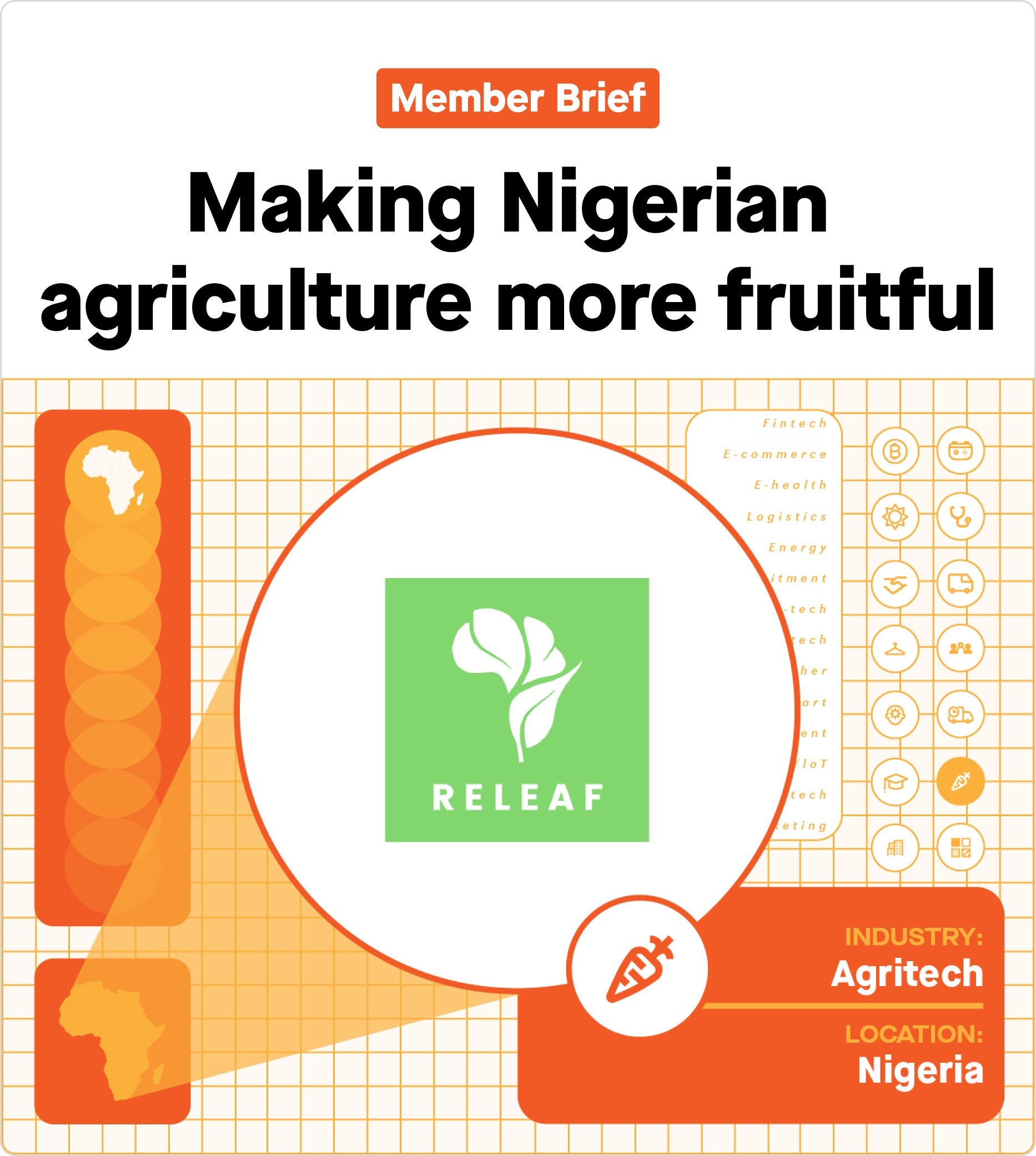✦ Making Nigerian agriculture more fruitful
Can agritech make more money for farmers and businesses?


Hi Quartz Africa members,
Food security challenges in Africa have mounted in the past year, as Russia’s invasion of Ukraine resulted in sky-high prices of key commodities including wheat and oil. Around 85% of Africa’s wheat supplies come from overseas, with 32% coming from Russia (pdf) and 12% from Ukraine. Since food accounts for around 40% of consumer spending on the continent, the combination of inflation and the lingering economic impact of the pandemic are eroding Africans’ purchasing power.
It would help if the continent was able to produce more of its own food supplies, yet Africa’s agricultural productivity stands below its potential despite the fact that it hosts 60% of the world’s arable land, and more than two thirds of its population are smallholder farmers.
A 2019 analysis by McKinsey determined that Africa could produce two to three times more cereals and grains than it does, which could add 20% more cereals and grains to the current worldwide output of 2.6 billion tons.
What holds the African agriculture sector back? A mix of challenges including underinvestment, underdeveloped infrastructure, high input costs, inadequate financing, widespread absence of technology in agriculture, corruption, and problematic policies.
As an example, for at least two decades, most African countries failed to live up to their commitments on agriculture expenditure at 10% of their national budget. Of 13 countries surveyed in a Food and Agriculture Organization (FAO) analysis, only one country—Malawi—has consistently met the target. One other, Mali, had achieved it for a number of years, but, the remaining 11 failed to meet the target at all. In some cases, food and agriculture got only around 3% of the national budget.
The complexity of agriculture markets means that, to improve productivity, concerted efforts are necessary from stakeholders including startups, governments and regulators, farmers, agro-processing firms, lenders, and traders.
Cheat Sheet
💡The opportunity: Technology can help improve agricultural productivity by making it easier and more affordable for farmers to access financing, inputs, and markets.
🤔The challenge: Infrastructure is poor in many parts of Africa, and inadequate public expenditure on agriculture hinders growth.
🗺️The roadmap: Empowering farmers by enabling them to access affordable financing, inputs, technology, and better infrastructure.
💰The stakeholders: Farmers, governments, startups, policy-makers, and financiers.
$1.2 billion: Value of agricultural exports from Nigeria in 2021
60%: Farmers as a share of the population in sub-Saharan Africa
25: African countries that import more than a third of their wheat supplies from Russia and Ukraine
40%: Food as a share of consumer spending in Africa
1.5%: Nigeria’s contribution to the world’s total palm oil output, making it the world’s fifth largest palm oil producer
Case study
Releaf was founded as a social entrepreneurship venture five years ago by Ikenna Nzewi and Uzoma Ayogu, aiming to make agriculture more profitable and efficient for farmers and agro-processors in Nigeria.
After graduating from Y Combinator in 2017 and conducting extensive research on different agricultural value chains across 20 states in Nigeria, Releaf chose to initially focus its mission on palm nuts, primarily because of demand. Nigeria is the fifth largest palm oil producer in the world, with an output of 1.4 million metric tons in 2021. Palm kernel oil is a key ingredient in the large-scale production of various soaps, detergents, hair creams, body creams, and food products.
Releaf offers farmers low-interest financing, technology that makes palm nut deshelling more efficient, and access to a stream of buyers.
Deshelling refers to the process of separating the palm kernel nut from the palm kernel shell. Kraken, the company’s deshelling machine, is designed to help farmers save time, increase output and quality, and reduce post-harvest losses. According to Releaf, its technology is 240 times faster than deshelling by hand and 25% faster than locally available cracking equipment.
Releaf’s financing schemes, meanwhile, allow farmers to access short-term credit for equipment, inputs, and their day-to-day expenses. The farmers receive cash and pay in palm nut supplies to Releaf. The 30-day loans are charged 5% interest. According to Releaf, it has so far issued over 750 loans, with the average loan size standing at $279.
The company’s data on farmers’ productivity helps them assess their risk profiles and collateralize the loans against their productivity. The program also helps them lower costs by bringing down the average price paid for the crop.
In 2021, Releaf raised $2.7 million to scale its technology, in addition to $1.5 million in grants from The Challenge Fund for Youth Employment (CFYE) and USAID. Next up on Releaf’s to-do list is expansion—both in terms of financing offering, markets, and crops.
In conversation with Uzoma Ayogu

🛣️ On the importance of improving infrastructure for agriculture to thrive:
“If I could fix one thing, it would be rural roads. It’s a very predictable investment that would unlock numerous opportunities.”
🤑 On focusing on the rural economy:
“If you want to build a big business, you need to serve the mass market…You need to help them either make more money or spend less money.”
🔩 On needing to customize their deshelling technology:
“Kraken needed to be able to deal with multiple species in the market. Majority of production is at the smaller level so you don’t have mono-crop controlling [growing single varieties]. Many farmers in Nigeria crack palm nuts by hand, an energy-consuming and inefficient process. Our early experiences with faulty shelling machines imported from China, which couldn’t adapt to the different varieties of palm nuts grown in Nigeria, led to the development of our proprietary hardware.
Agritech Deals to 👀
Nile, a South African agritech startup, raised $5.1 million in May 2022, in an equity funding round led by Naspers Foundry. Nile connects farmers to commercial retailers of fresh produce in South Africa and across the continent.
In April 2022, Farmerline, a Ghanaian agritech startup, announced a $6.4 million pre-Series A investment plus another $6.5 million in debt. Through partnerships with agribusinesses and farm associations, it offers farmers high-quality fertilizer and seeds, free education on climate-smart farming practices, and access to international markets.
In August 2022, iProcure, a Kenyan agritech startup, announced a $10.2 million Series B financing led by Investisseurs & Partenaires. The startup provides agricultural inputs such as fertilizers and seeds at discounted prices compared to prevailing market prices, and is rolling out credit for agribusinesses to make those purchases.
This member brief was prepared while listening to “Dar Mpaka Moro” by Tmk Wanaume (Tanzania). Have a great week!
— Martin Siele, Nairobi-based Quartz contributor
One 🌽 thing
The FAO estimates that Africa loses at least $4 billion worth of its total food production to post-harvest losses every year. Causes of post-harvest losses include diseases, insects, rodents, mechanical damage, premature harvesting, harvesting of overmature crops, improper harvesting and storage techniques, and lack of appropriate packaging and marketing systems.